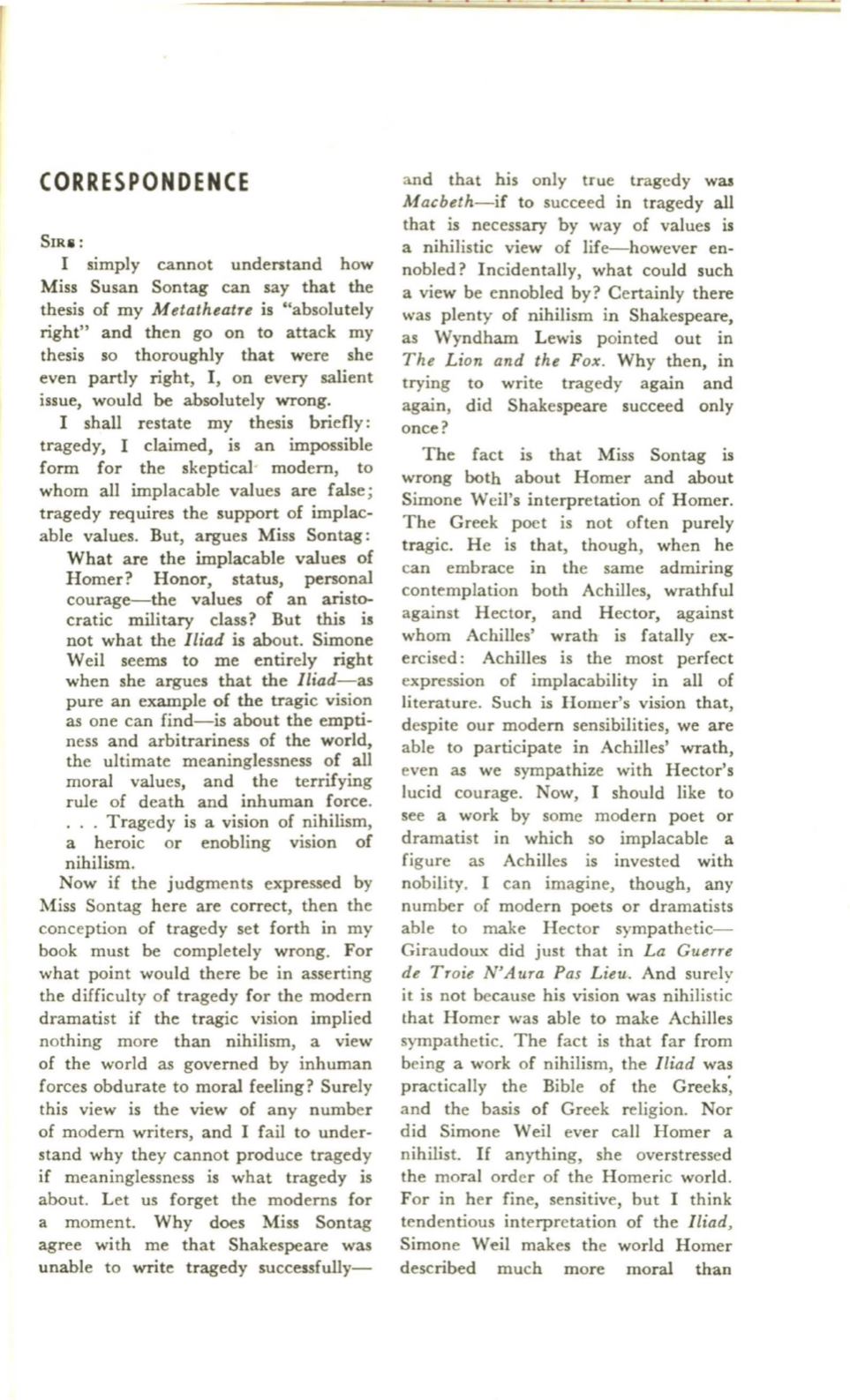
CORRESPONDENCE
SIRII:
I simply cannot understand how
Miss Susan Sontag can say that the
thesis of my
M etatheatre
is "absolutely
right" and then go on to attack my
thesis so thoroughly that were she
even partly right, I, on every salient
issue, would
be
absolutely wrong.
I shall restate my thesis briefly:
tragedy, I claimed, is an impossible
form for the skeptical' modem, to
whom all implacable values are false ;
tragedy requires the support of implac–
able values. But, argues Miss Sontag:
What are the implacable values of
Homer? Honor, status, personal
courage-the values of an aristo–
cratic military class? But this is
not what the
Iliad
is about. Simone
Weil seems to me entirely right
when she argues that the
Iliad-as
pure an example of the tragic vision
as one can find-is about the empti–
ness and arbitrariness of the world,
the ultimate meaninglessness of all
moral values, and the terrifying
rule of death and inhuman force.
... Tragedy is a vision of nihilism,
a heroic or enobling vision of
nihilism.
Now if the judgments expressed by
Miss Sontag here are correct, then the
conception of tragedy set forth in my
book must be completely wrong. For
what point would there be in asserting
the difficulty of tragedy for the modern
dramatist if the tragic vision implied
nothing more than nihilism, a view
of the world as governed by inhuman
forces obdurate to moral feeling? Surely
this view is the view of any number
of modern writers, and I fail to under–
stand why they cannot produce tragedy
if meaninglessness is what tragedy is
about. Let us forget the moderns for
a moment. Why does Miss Sontag
agree with me that Shakespeare was
unable to write tragedy successfully-
and that his only true tragedy waa
Macbeth- if
to succeed in tragedy all
that is necessary by way of values is
a nihilistic view of life-however en–
nobled? Incidentally, what could such
a view be ennobled by? Certainly there
was plenty of nihilism in Shakespeare,
as Wyndham Lewis pointed out in
The Lion and the Fox.
Why then, in
trying to write tragedy again and
again, did Shakespeare succeed only
once?
The fact is that Miss Sontag is
wrong both about Homer and about
Simone Wei!,s interpretation of Homer.
The Greek poet is not often purely
tragic. He is that, though, when he
can embrace in the same admiring
contemplation both Achilles, wrathful
against Hector, and Hector, against
whom Achilles' wrath is fatally ex–
ercised : Achilles is the most perfect
expression of implacability in all of
literature. Such is Homer's vision that,
despite our modern sensibilities, we are
able to participate in Achilles' wrath,
even as we sympathize with Hector's
lucid courage. Now, I should like to
see a work by some modern poet or
dramatist in which so implacable a
figure as Achilles is invested with
nobility. I can imagine, though, any
number of modern poets or dramatists
able to make H ector sympathetic–
Giraudoux did just that in
La Guerre
de Troie N'Aura Pas Lieu.
And surely
it is not because his vision was nihilistic
that Homer was able to make Achilles
sympathetic. The fact is that far from
being a work of nihilism, the
Iliad
was
practically the Bible of the Greeks;
and the basis of Greek religion. Nor
did Simone Weil ever call Homer a
nihilist.
If
anything, she overstressed
the moral order of the Homeric world .
For in her fine, sensitive, but I think
tendentious interpretation of the
Iliad,
Simone Wei
I
makes the world Homer
described much more moral than


